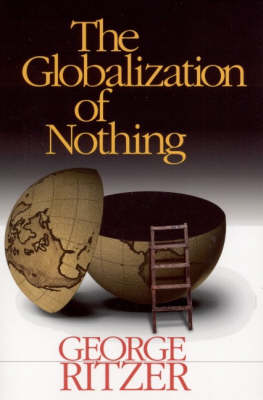In a world increasingly festooned with familiar logos - from the hallmark swoosh on a designer tennis shoe to the famous golden arches outside a fast-food chain - it is clear that these symbols are not merely decorative, but represent shifts in our social milieu. More specifically, the proliferation of such items as credit card offers, automated banking services, and globally recognizable brand names illustrate significant changes in the realm of social consumption: a trajectory toward a world of increasingly dehumanized services and meaningless places and things.George Ritzer theorizes in his provocative new book, The Globalization of Nothing, that the "grand narrative" or social story of this period is a movement from "something" to "nothing." Extending his renowned McDonaldization thesis, Ritzer contends that societies around the globe continue to move away from "something," defined as a social form that is generally indigenously conceived, locally controlled, and rich in distinctive content, toward "nothing" - that which is centrally controlled and conceived and relatively devoid of substance. It is in the movement toward the globalization of "nothing" that "something" is lost. More than likely, that "something" is an indigenous custom, a local store, a familiar gathering place, or simply personalized interaction.
The Globalization of Nothing takes the subject of globalization in new directions, introducing terms such as "grobalization." The key conflict in the world today is viewed as that between the grobalization of nothing and the glocalization of something. This book is structured around four organizing concepts addressing this issue: "non-places," "non-things," "non-people," and "non-services." By drawing upon salient examples from everyday life, George Ritzer invites the reader to examine the nuances of these concepts in conjunction with the paradoxes within the process of the globalization of nothing. Why is it that those who produce "nothing" for major multinational corporations often cannot afford that which they produce? Why do some people seem to be enraptured with their favorite brands or with their credit cards? What are the social implications of the increasing "globalization of nothing" for the medical, education, and tourism industries? Critical questions are raised throughout the book and the reader is compelled not only to seek answers to these questions, but to critically evaluate the questions as well as the answers they themselves conceive.
The Globalization of Nothing is ideal as a text for courses in sociology, anthropology, communication, business, and related disciplines. This book is also recommended for anyone interested in the critical study of contemporary social phenomona.
Click on ′Additional Materials′ to read sample chapters.
- ISBN10 0761988076
- ISBN13 9780761988076
- Publish Date 9 September 2003
- Publish Status Out of Print
- Out of Print 18 February 2010
- Publish Country US
- Imprint SAGE Publications Inc
- Format Paperback
- Pages 280
- Language English
